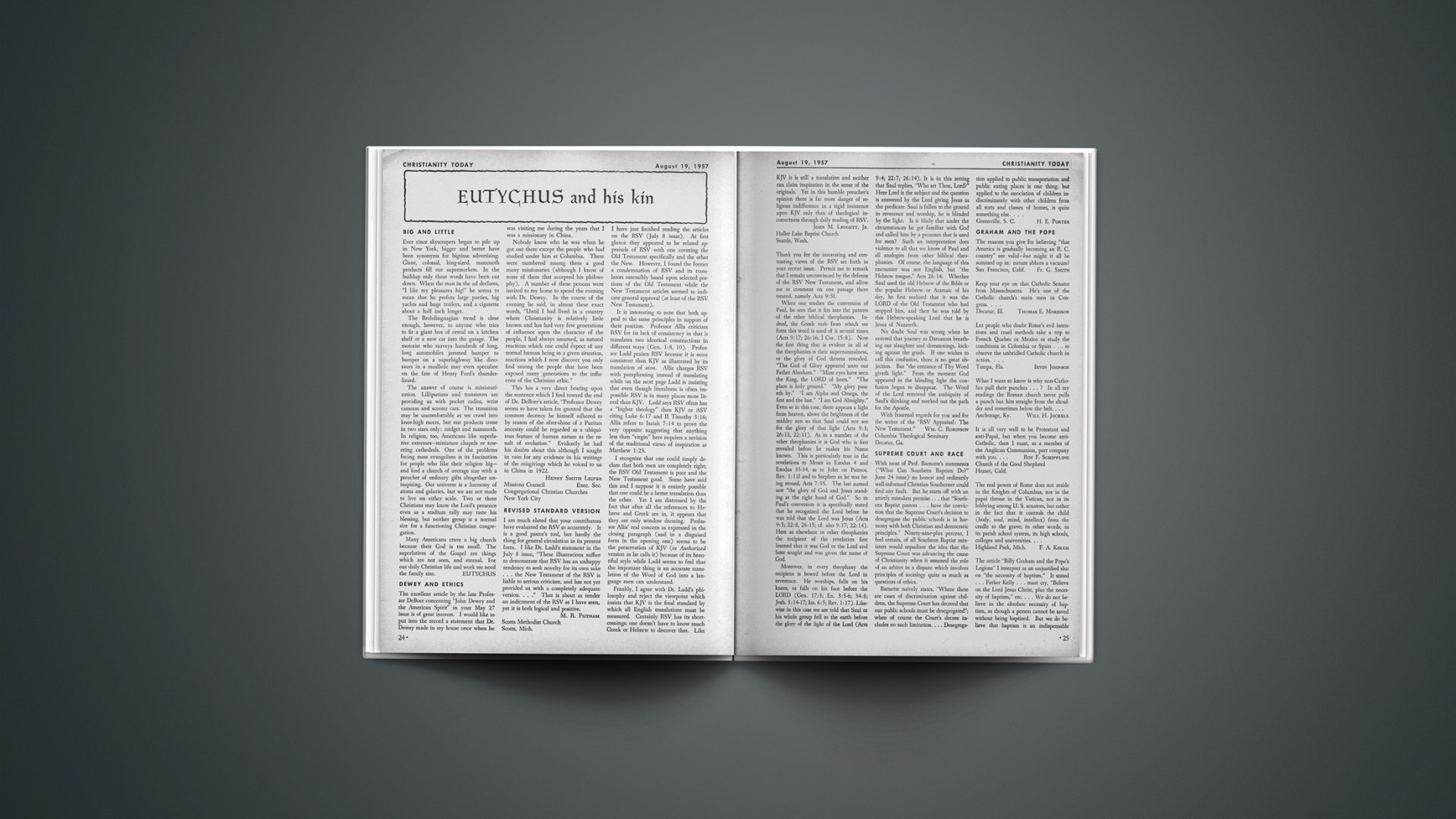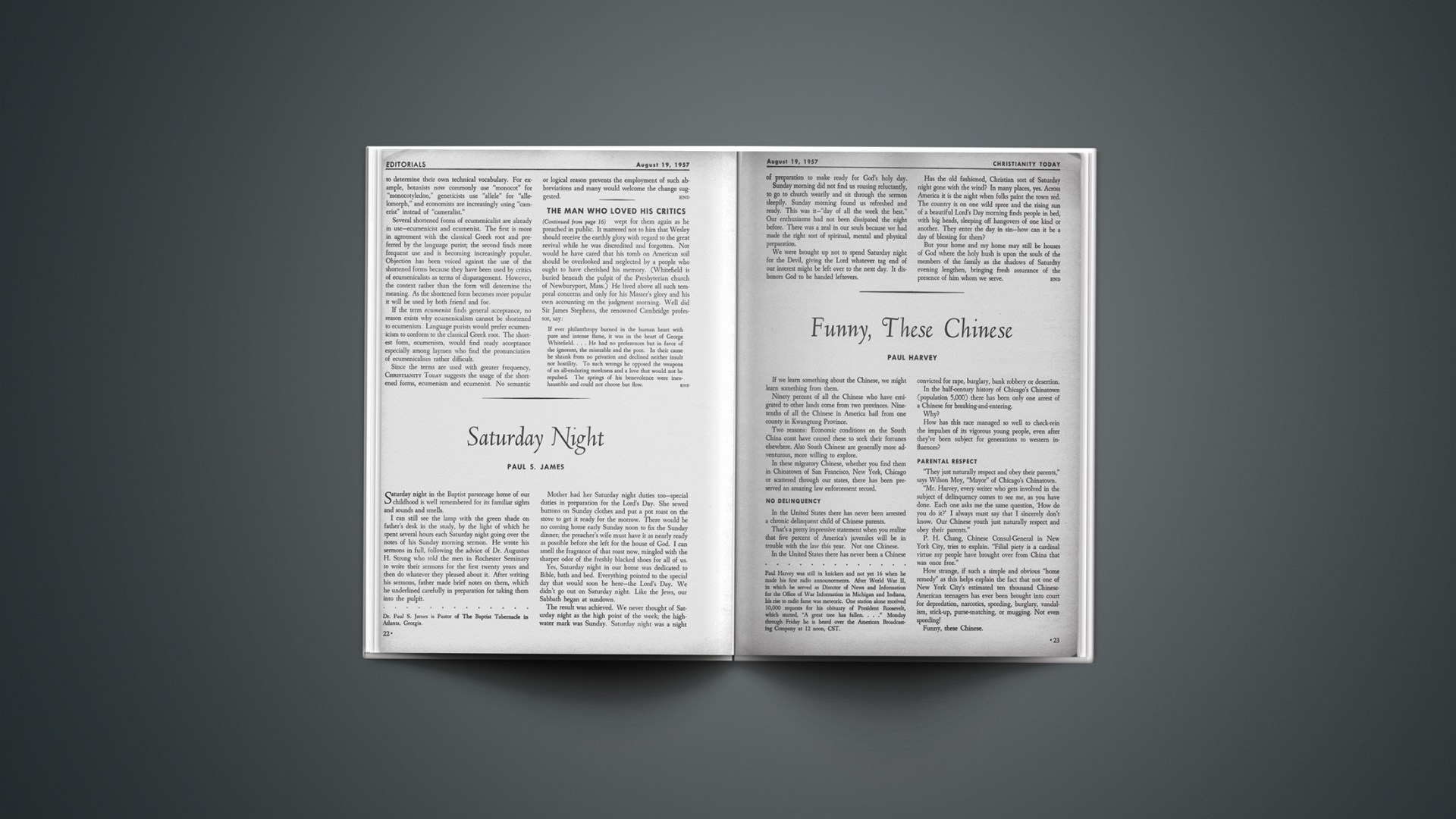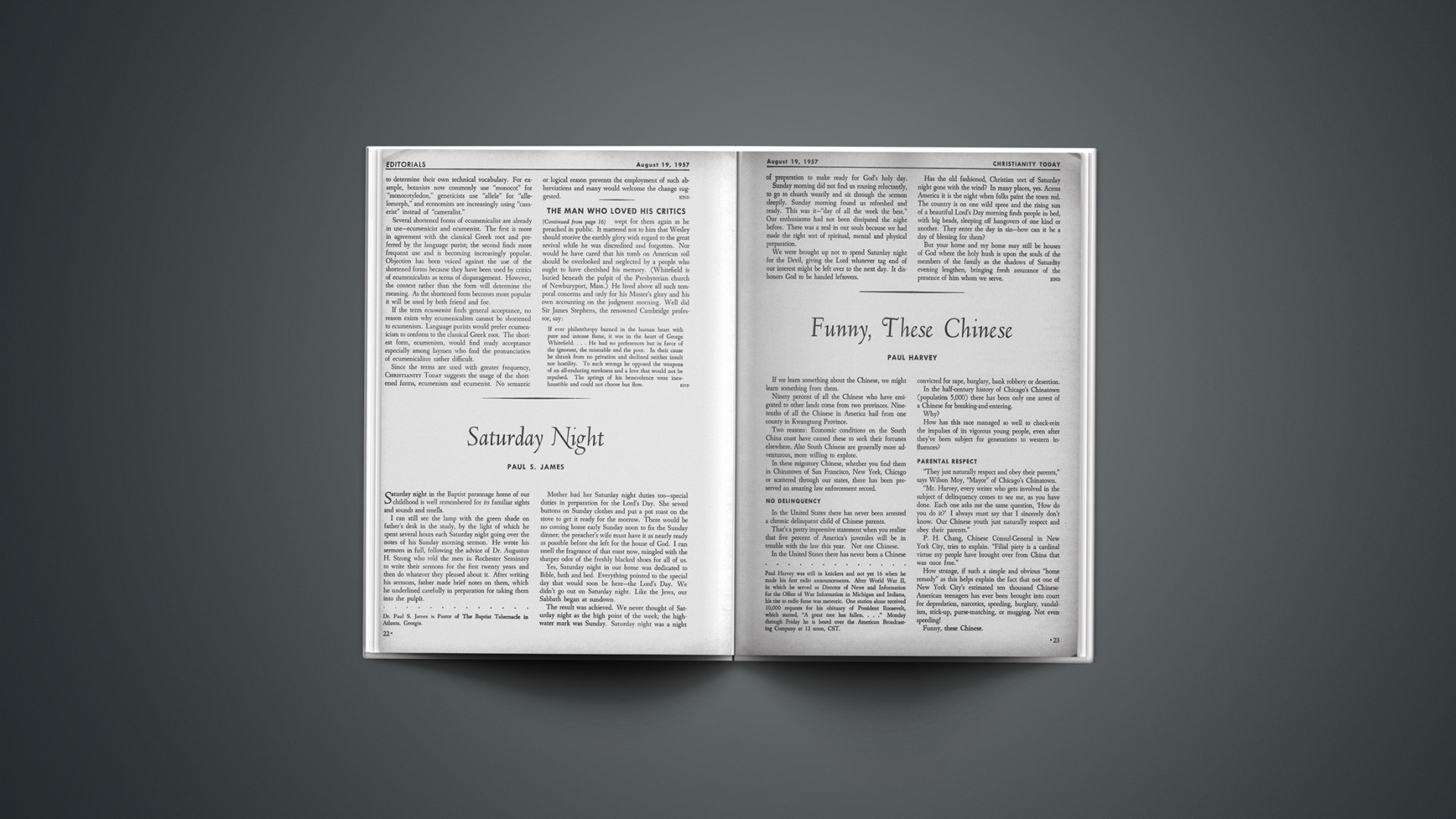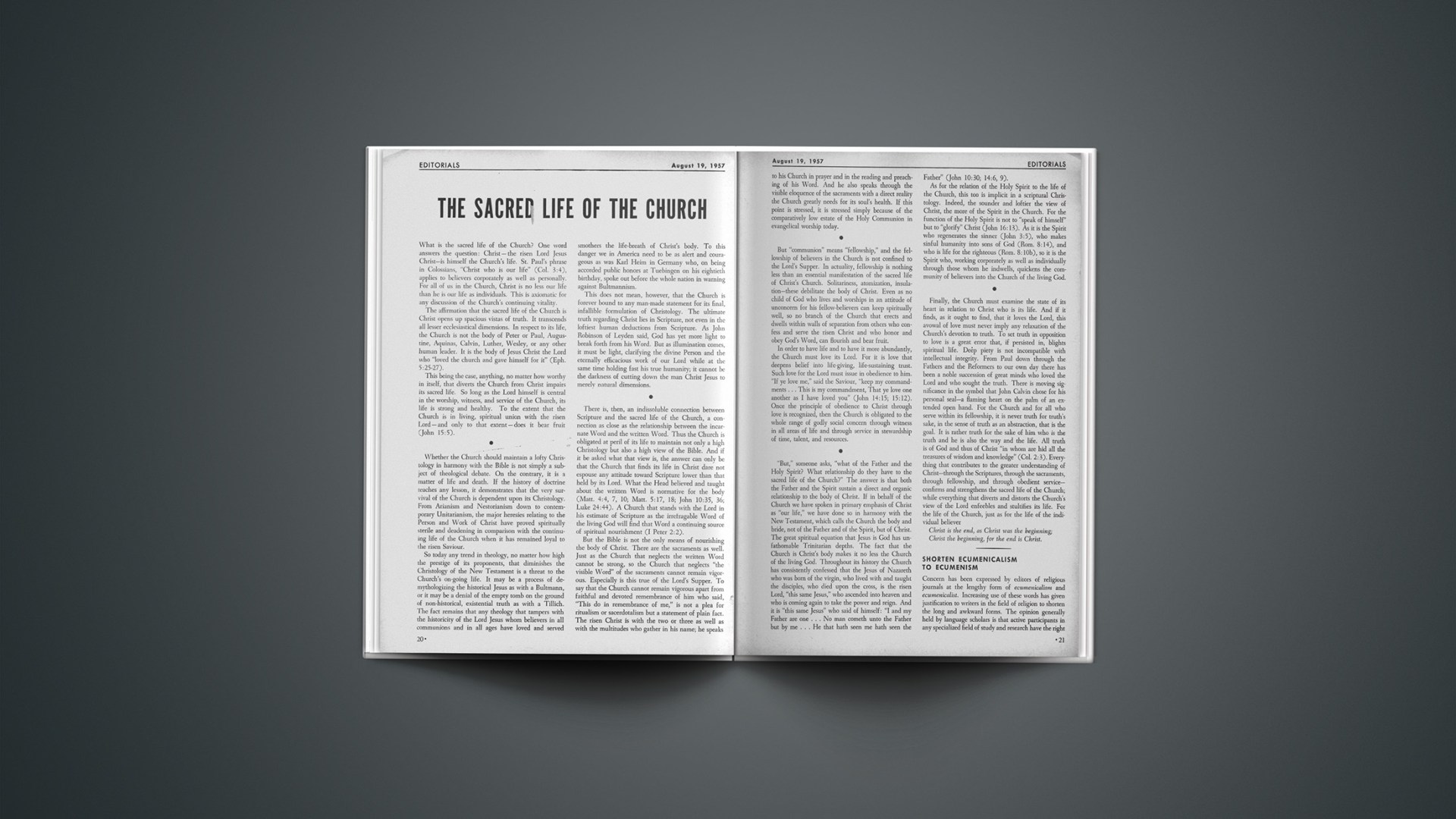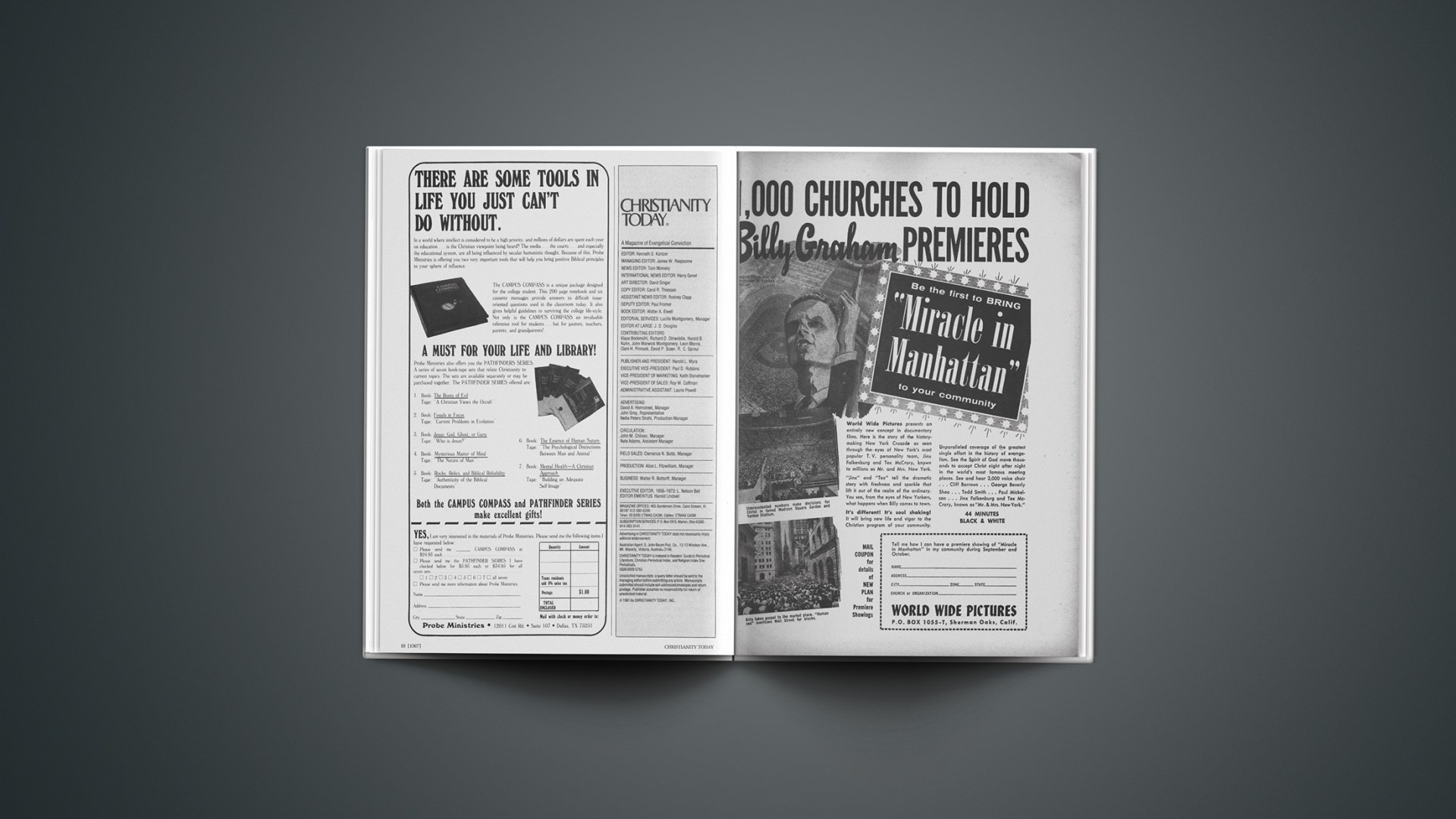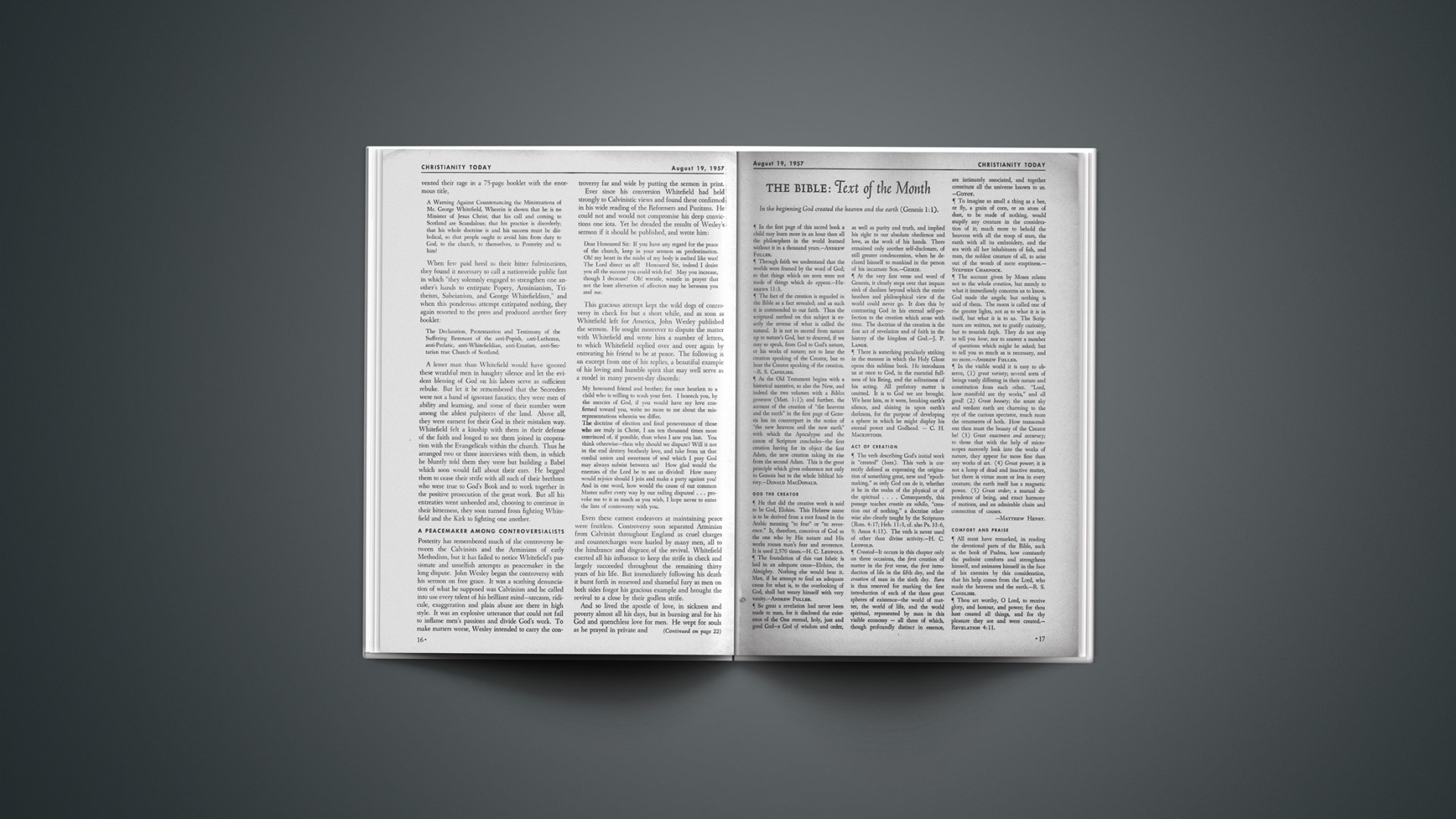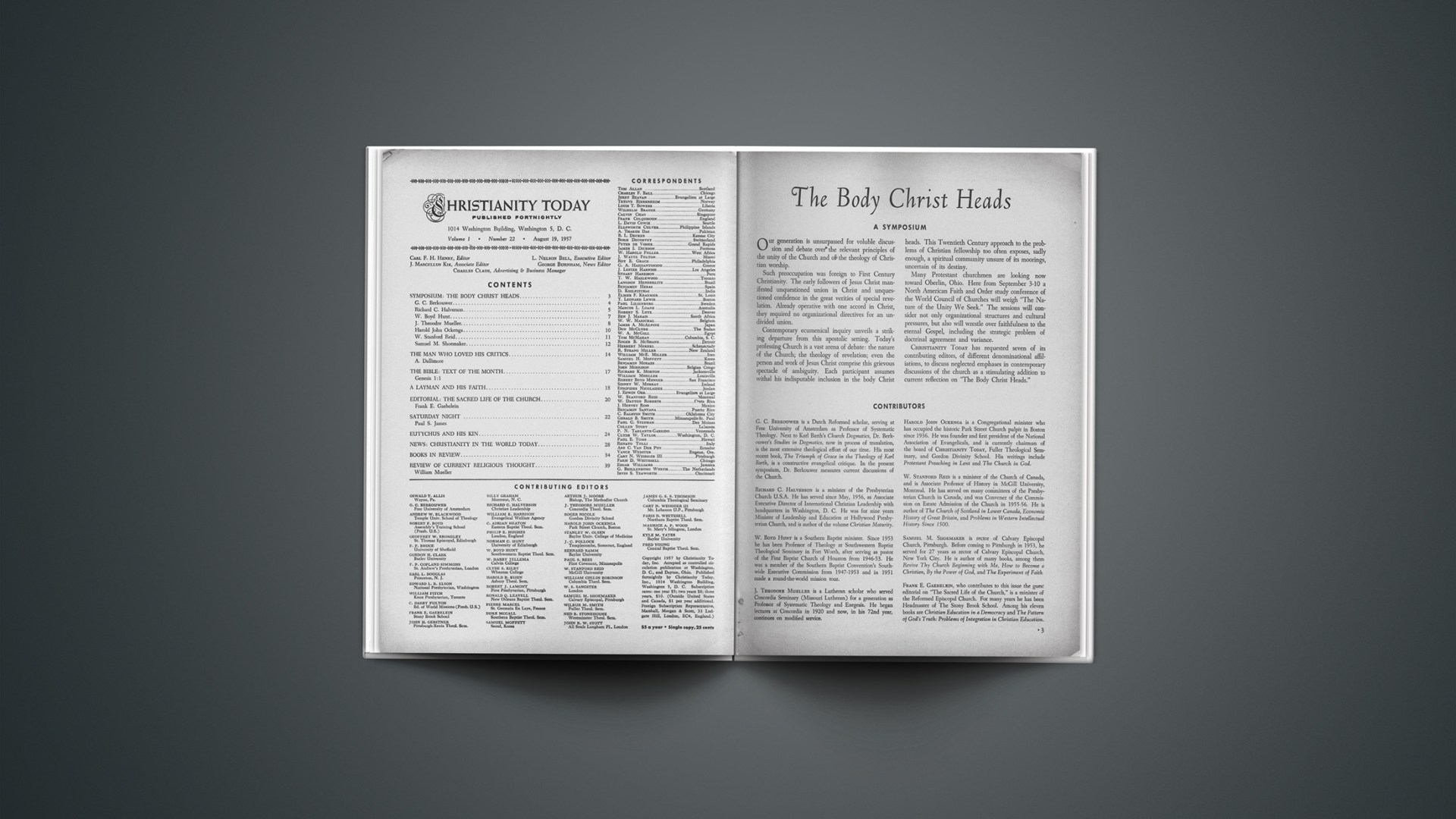BIG AND LITTLE
Ever since skyscrapers began to pile up in New York, bigger and better have been synonyms for bigtime advertising. Giant, colossal, king-sized, mammoth products fill our supermarkets. In the buildup only these words have been cut down. When the man in the ad declares, “I like my pleasures big!” he seems to mean that he prefers large parties, big yachts and huge trailers, and a cigarette about a half inch longer.
The Brobdingnagian trend is clear enough, however, to anyone who tries to fit a giant box of cereal on a kitchen shelf or a new car into the garage. The motorist who surveys hundreds of long, long automobiles jammed bumper to bumper on a superhighway like dinosaurs in a mudhole may even speculate on the fate of Henry Ford’s thunder-lizard.
The answer of course is miniaturization. Lilliputians and transistors are providing us with pocket radios, wrist cameras and scooter cars. The transition may be uncomfortable as we crawl into knee-high racers, but our products come in two sizes only: midget and mammoth. In religion, too, Americans like superlative extremes—miniature chapels or towering cathedrals. One of the problems facing mass evangelism is its fascination for people who like their religion big—and find a church of average size with a preacher of ordinary gifts altogether uninspiring. Our universe is a harmony of atoms and galaxies, but we are not made to live on either scale. Two or three Christians may know the Lord’s presence even as a stadium rally may taste his blessing, but neither group is a normal size for a functioning Christian congregation.
Many Americans crave a big church because their God is too small. The superlatives of the Gospel are things which are not seen, and eternal. For our daily Christian life and work we need the family size.
EUTYCHUS
DEWEY AND ETHICS
The excellent article by the late Professor DeBoer concerning “John Dewey and the American Spirit” in your May 27 issue is of great interest. I would like to put into the record a statement that Dr. Dewey made in my house once when he was visiting me during the years that I was a missionary in China.
Nobody knew who he was when he got out there except the people who had studied under him at Columbia. There were numbered among them a good many missionaries (although I know of none of them that accepted his philosophy). A number of these persons were invited to my home to spend the evening with Dr. Dewey. In the course of the evening he said, in almost these exact words, “Until I had lived in a country where Christianity is relatively little known and has had very few generations of influence upon the character of the people, I had always assumed, as natural reactions which one could expect of any normal human being in a given situation, reactions which I now discover you only find among the people that have been exposed many generations to the influence of the Christian ethic.”
This has a very direct bearing upon the sentence which I find toward the end of Dr. DeBoer’s article, “Professor Dewey seems to have taken for granted that the common decency he himself adhered to by reason of the after-shine of a Puritan ancestry could be regarded as a ubiquitous feature of human nature as the result of evolution.” Evidently he had his doubts about this although I sought in vain for any evidence in his writings of the misgivings which he voiced to us in China in 1922.
HENRY SMITH LEIPER
Exec. Sec.
Missions Council
Congregational Christian Churches
New York City
REVISED STANDARD VERSION
I am much elated that your contributors have evaluated the RSV so accurately. It is a good pastor’s tool, but hardly the thing for general circulation in its present form. I like Dr. Ladd’s statement in the July 8 issue, “These illustrations suffice to demonstrate that RSV has an unhappy tendency to seek novelty for its own sake … the New Testament of the RSV is liable to serious criticism, and has not yet provided us with a completely adequate version.…” That is about as tender an indictment of the RSV as I have seen, yet it is both logical and positive.
M. R. PUTNAM
Scotts Methodist Church
Scotts, Mich.
I have just finished reading the articles on the RSV (July 8 issue). At first glance they appeared to be related appraisals of RSV with one covering the Old Testament specifically and the other the New. However, I found the former a condemnation of RSV and its translators ostensibly based upon selected portions of the Old Testament while the New Testament articles seemed to indicate general approval (at least of the RSV New Testament).
It is interesting to note that both appeal to the same principles in support of their position. Professor Allis criticizes RSV for its lack of consistency in that it translates two identical constructions in different ways (Gen. 1:8, 10). Professor Ladd praises RSV because it is more consistent than KJV as illustrated by its translation of aion. Allis charges RSV with paraphrasing instead of translating while on the next page Ladd is insisting that even though literalness is often impossible RSV is in many places more literal than KJV. Ladd says RSV often has a “higher theology” than KJV or ASV citing Luke 6:17 and 2 Timothy 3:16; Allis refers to Isaiah 7:14 to prove the very opposite suggesting that anything less than “virgin” here requires a revision of the traditional views of inspiration at Matthew 1:23.
I recognize that one could simply declare that both men are completely right; the RSV Old Testament is poor and the New Testament good. Some have said this and I suppose it is entirely possible that one could be a better translation than the other. Yet I am distressed by the fact that after all the references to Hebrew and Greek are in, it appears that they are only window dressing. Professor Allis’ real concern as expressed in the closing paragraph (and in a disguised form in the opening one) seems to be the preservation of KJV (or Authorized version as he calls it) because of its beautiful style while Ladd seems to feel that the important thing is an accurate translation of the Word of God into a language men can understand.
Frankly, I agree with Dr. Ladd’s philosophy and reject the viewpoint which insists that KJV is the final standard by which all English translations must be measured. Certainly RSV has its shortcomings; one doesn’t have to know much Greek or Hebrew to discover that. Like KJV it is still a translation and neither can claim inspiration in the sense of the originals. Yet in this humble preacher’s opinion there is far more danger of religious indifference in a rigid insistence upon KJV only than of theological incorrectness through daily reading of RSV.
JOHN M. LEGGETT, JR.
Haller Lake Baptist Church
Seattle, Wash.
Thank you for the interesting and contrasting views of the RSV set forth in your recent issue. Permit me to remark that I remain unconvinced by the defense of the RSV New Testament, and allow me to comment on one passage there treated, namely Acts 9:5 f.
When one studies the conversion of Paul, he sees that it fits into the pattern of the other biblical theophanies. Indeed, the Greek verb from which we form this word is used of it several times (Acts 9:17; 26:16; 1 Cor. 15:8). Now the first thing that is evident in all of the theophanies is their supernaturalness, or the glory of God therein revealed. “The God of Glory appeared unto our Father Abraham.” “Mine eyes have seen the King, the LORD of hosts.” “The place is holy ground.” “My glory passeth by.” “I am Alpha and Omega, the first and the last.” “I am God Almighty.” Even so in this case, there appears a light from heaven, above the brightness of the midday sun so that Saul could not see for the glory of that light (Acts 9:3; 26:13, 22:11). As in a number of the other theophanies it is God who is first revealed before he makes his Name known. This is particularly true in the revelations to Moses in Exodus 4 and Exodus 33–34, as to John on Patmos, Rev. 1:11 f and to Stephen as he was being stoned, Acts 7:55. The last named saw “the glory of God and Jesus standing at the right hand of God.” So in Paul’s conversion it is specifically stated that he recognized the Lord before he was told that the Lord was Jesus (Acts 9:5; 22:8, 26:15; cf. also 9:17; 22:14). Here as elsewhere in other theophanies the recipient of the revelation first learned that it was God or the Lord and later sought and was given the name of God.
Moreover, in every theophany the recipient is bowed before the Lord in reverence. He worships, falls on his knees, or falls on his face before the LORD (Gen. 17:3; Ex. 3:5–6; 34:8; Josh. 5:14–17; Isa. 6:5; Rev. 1:17). Likewise in this case we are told that Saul or his whole group fell to the earth before the glory of the light of the Lord (Acts 9:4; 22:7; 26:14). It is in this setting that Saul replies, “Who art Thou, Lord?” Here Lord is the subject and the question is answered by the Lord giving Jesus as the predicate. Saul is fallen to the ground in reverence and worship, he is blinded by the light. Is it likely that under the circumstances he got familiar with God and called him by a pronoun that is used for men? Such an interpretation does violence to all that we know of Paul and all analogies from other biblical theophanies. Of course, the language of this encounter was not English, but “the Hebrew tongue,” Acts 26:14. Whether Saul used the old Hebrew of the Bible or the popular Hebrew or Aramaic of his day, he first realized that it was the LORD of the Old Testament who had stopped him, and then he was told by this Hebrew-speaking Lord that he is Jesus of Nazareth.
No doubt Saul was wrong when he entered that journey to Damascus breathing out slaughter and threatenings, kicking against the goads. If one wishes to call this confusion, there is no great objection. But “the entrance of Thy Word giveth light.” From the moment God appeared in the blinding light the confusion began to disappear. The Word of the Lord removed the ambiguity of Saul’s thinking and marked out the path for the Apostle.
With fraternal regards for you and for the writer of the “RSV Appraisal: The New Testament.”
WM. C. ROBINSON
Columbia Theological Seminary
Decatur, Ga.
SUPREME COURT AND RACE
With most of Prof. Barnette’s statements (“What Can Southern Baptists Do?” June 24 issue) no honest and ordinarily well-informed Christian Southerner could find any fault. But he starts off with an utterly mistaken premise … that “Southern Baptist pastors … have the conviction that the Supreme Court’s decision to desegregate the public schools is in harmony with both Christian and democratic principles.” Ninety-nine-plus percent, I feel certain, of all Southern Baptist ministers would repudiate the idea that the Supreme Court was advancing the cause of Christianity when it assumed the role of an arbiter in a dispute which involves principles of sociology quite as much as questions of ethics.
Barnette naively states, “Where there are cases of discrimination against children, the Supreme Court has decreed that our public schools must be desegregated”; when of course the Court’s decree includes no such limitation.… Desegregation applied to public transportation and public eating places is one thing; but applied to the association of children indiscriminately with other children from all sorts and classes of homes, is quite something else.…
H. E. PORTER
Greenville, S. C.
GRAHAM AND THE POPE
The reasons you give for believing “that America is gradually becoming an R. C. country” are valid—but might it all be summed up in: nature abhors a vacuum?
FR. G. SMITH
San Francisco, Calif.
Keep your eye on that Catholic Senator from Massachusetts. He’s one of the Catholic church’s main men in Congress.…
THOMAS E. MORRISON
Decatur, Ill.
Let people who doubt Rome’s evil intentions and cruel methods take a trip to French Quebec or Mexico or study the conditions in Colombia or Spain … to observe the unbridled Catholic church in action.…
IRVIN JOHNSON
Tampa, Fla.
What I want to know is why non-Catholics pull their punches …? In all my readings the Roman church never pulls a punch but hits straight from the shoulder and sometimes below the belt.…
WILL H. JOCKELL
Anchorage, Ky.
It is all very well to be Protestant and anti-Papal, but when you become anti-Catholic, then I must, as a member of the Anglican Communion, part company with you.…
ROY F. SCHIPPLING
Church of the Good Shepherd
Hemet, Calif.
The real power of Rome does not reside in the Knights of Columbus, nor in the papal throne in the Vatican, nor in its lobbying among U. S. senators, but rather in the fact that it controls the child (body, soul, mind, intellect) from the cradle to the grave; in other words, in its parish school system, its high schools, colleges and universities.…
F. A. KOLCH
Highland Park, Mich.
The article “Billy Graham and the Pope’s Legions” I interpret as an unjustified slur on “the necessity of baptism.” It stated … Father Kelly … must cry, “Believe on the Lord Jesus Christ, plus the necessity of baptism,” etc.… We do not believe in the absolute necessity of baptism, as though a person cannot be saved without being baptized. But we do believe that baptism is an indispensable part of Christ’s command and therefore may not be regarded as unessential.…
V. EUGENE JOHNSON
Benton Lutheran Church
Crooks, S. D.
I like the way Billy is doing it better than the way his critics are not doing it.
FRED A. FELS, JR.
Panorama Baptist Church
Pacoima, Calif.
THE WELFARE STATE
I hesitate to take issue with Dr. Joseph M. Dawson for whom I have great admiration. But it seems to me that when he writes about “The Christian View of the State” (Christianity Today, June 24, 1957), he does not always understand the full import of what it is he recommends. He closes his article with a sentence, “ ‘What does it do to man?’ is the validating question to ask of any government.” I agree. Several paragraphs earlier he attempts to translate into particulars the point of view expressed by the World Council of Churches at Evanston. When he does so, he lists the familiar features of the modern state: social security, funds for veterans, housing, agricultural subsidies, regulation of public carriers, and so on.
One need not question the benevolent impulses which can be mustered behind every one of these proposals. But we do need an accurate statement of what each of them involves in order to know what it is we are judging in terms of our scale of values. Modern life has exposed men to new kinds of uncertainties, and so they have yielded easily to the suggestion that a vast extension of political activity will give them the assurances they crave. But as government has gradually extended its sway over domains once regarded as private, that assurance has not come. Instead, people are more jittery than before, and with excellent reason.
To select the first item on the list, we might ask, “What does social security do to people?” This federal program does not stand in isolation; it is a facet of a widely accepted philosophy of government. All modern political welfare schemes rest on the premise that a government may rightfully assume major control over the property of its citizens. This is virtually equivalent to saying that the citizen holds title to his earnings at the sufferance of government and only to the remainder after government has garnisheed whatever portion of his wages it decrees. To put it bluntly, the federal social security program imposes a payroll tax which bears most heavily on those least able to pay; and, to avoid the resistance which would result if such a tax were levied openly, the program takes its cut out of wages before the earner even sees them.
These are unsavory considerations to surround a political program which purports to be a “governmental extension of love,” but this is not all. The federal program of social security is compulsory, except for a few occupational groups. The man who, however mistaken we might deem him, decides that he can take care of his old age better than government can take care of his old age for him, is not allowed to carry out his plans. He is forced to accept the plans thrust on him by the will of the majority. What becomes of the rights of the individual conscience in such cases as these?
I know it will be said that this is too trivial a matter to waste any powder on, that if some ignorant, stubborn fellow doesn’t know what’s good for him he has to be taught somehow. To which two rejoinders might be made. First, let us not dignify this hard-headed, expedient reaction by giving it the sanction of our religion. Secondly, listen to the words of an anonymous editor of last century. We “no more see a crushing tyranny in a trivial unfairness or a ludicrous indignity, than the eye uninformed by reason can discern the oak in the acorn.… Hence the necessity of denouncing with unwearied and even troublesome perseverance a single act of oppression.”
EDMUND A. OPITZ
Foundation for Economic Education
Irvington-on-the-Hudson, New York
LIBERAL OR EVANGELICAL
Fosdick’s appreciation of fundamentalism far outshines your unwarranted attack on his convictions. That light will continue to guide many a storm-tossed theological neophyte for generations to come.…
ALLEN H. GATES
First Cong. Church
Chesterfield, Mass.
In discussing Modernism, Barthianism, Neo-Orthodoxy and “way-stations” you are objective, careful with facts and respectful towards the adherents of such errors.… Is it necessary … to manifest opposite characteristics in discussing Fundamentalism?…
MILTON E. FISH
Long Beach, Calif.
Your articles “Dare We Renew the Controversy” are not only relevant and penetrating, but are in the finest tradition of Christian love and wisdom.
A. F. BALLBACH JR.
First Baptist Church
Oneonta, N. Y.
Back here in the sticks we haven’t yet received word that the war is over. We are still fighting.… C’mon down from your ivory tower and into the field of battle; the fighting is fine!
JAMES MACKENZIE
The Presbyterian Church
Edenton, N. C.
The question at heart is, simply enough, … dare truth still refute error; or better still, shall we still “resist the devil.” … Why you should … give publicity to such as Barth and Brunner … is hard to understand. Really what good are these and such like men to the Church?
Galway, N. Y.
JOHN H. GREENING
When was Satan cast into the Lake of Fire and the ages of the ages begun?… Flora, Ind.
JOHN W. EVANS JR.
We need no longer to “revive the conflict”; only promote the gospel.…
KENNETH W. PAUL
Asst. to the Chaplain
Central Louisiana State Hospital
Pineville, La.
The largeness of your point of view is in striking contrast to the narrowness of organized Fundamentalism.…
HAROLD PAUL SLOAN
Browns Mills, N. J.
I write … in view of the excellency and timeliness of your great article on the … modernist-fundamentalist conflict. The sanity and wisdom of this article commends itself to every thoughtful person, especially those … familiar with the history of the movements concerned.…
ROBERT H. MERCER
St. George’s P.E. Church
Pawtucket, R. I.
Your “Dare We Renew the Controversy?” is refreshing to my mind.…
LISTON L. MAY
Simpson Bible College
San Francisco, Calif.
IS THE STATE SECULAR?
In your article by Dr. Joseph M. Dawson (June 24 issue) we find him discussing “The purely religious nature of the church and the essentially secular functions of the state.” One is not surprised to find that Dr. Dawson is a devout follower of Roger Williams. It is a serious falsification to call a state “secular” which began with “a decent respect of nature’s God” and ever declares itself “under God” and “in God we trust”; which inaugurates its President with prayers; which prays in all its legislatures and includes the Bible in the schools of 36 states, and sends chaplains everywhere with its armed forces and gives thanks to God for all its blessings.
A state can be “secular.” The French Constitution begins, The Republic of France is secular. That is their choice. We don’t want it.
Dr. Dawson concludes: “Democracy recognizes that man’s personality is the highest value in the universe.” Mr. Editor, you must have expected a challenge to that!
FRANK DYER
Santa Monica, Calif.
First we drag in religion by the horns into public and semi-public functions, some supported by taxes from people of all and of no religious faiths. Then, to be “fair” we give every religious leader in town—again, of every shade—a turn at officiating. Now somebody objects (CHRISTIANITY TODAY, June 10, p. 30) because some preacher, priest, rabbi or reader expresses his honest convictions in an audible prayer before such a group. What about the people who have to listen … and are expected to join in such a prayer?… Must the humanist sit still while a preacher talks about the hereafter or the professed atheist remain quiet while a religionist appeals to some deity? Must the Protestant say “Amen” to a prayer addressed to Mary … and the Unitarian likewise to a Trinitarian prayer?
The whole thing started when we separated religion and education as if that is a corollary to the separation of church and state. These confusing situations will end only when we integrate religion and education as all other peoples have always done and as America did until about a century ago.…
KARL F. BREEHNE
Our Redeemer Lutheran Church
Greenville, Ill.
TIME AND TIDE
I appreciate many of the good things which come out of the New World, but its theology is not one of them …
PETER F. R. REES
St. Peter’s Vicarage
Haslingden, Rossendale
Langs, England
I receive your publication regularly and I regularly throw it away without removing the wrapper.…
NELSON P. MOYER
Homer Methodist Church
Homer, Alaska
… A devilish and unchristian thing.… devilish, hellish blindness and ignorance.
N. S. ANDERSON
United Church of Canada
Maidstone, Ontario
… Greatly appreciate the service that you are rendering in this day of confusion …
WILLIAM F. DINKINS
Selma, Ala.
Not in the 58 years of my ministry have I experienced a greater thrill in reading a religious paper …
J. B. HUNLEY
Olive Branch Christian Church
Toano, Va.
I keep on saying to myself, This is good writing, vital, and spiritually valuable … Rectory, Stanford-on-Soar
J. ROBERTS
Loughborough, Leics, England
Enclosed is my $5—not because I believe in your point of view but because you are showing so much better spirit than is usually shown by your school of thought.
J. RICHMOND MORGAN
First Congregational Church
Peru, Ill.
… I must confess that after a first, suspecting and searching look at the journal it began to grow upon me. I read the copies from cover to cover—and now I am under moral obligation. So here is my $5 …
ARNOLD F. KELLER
Church of the Redeemer
Utica, N. Y.
Quite frankly I at first tossed the copies into the waste basket. One issue, however, I read, and I have been reading them all ever since … What a joy it is to read your full-bodied defence and preaching of the Gospel …
H. D. GASSON
Church of St. John the Baptist
Sanbornville, N. H.
Your magazine is superb. I have been looking for such a publication for years.
R. W. DURNAL
Azusa, Calif.
Welcome as a summer breeze, and just as refreshing.… After being exposed to liberalism …, first in college, and since in many of the so-called “religious magazines” … it is truly a delightful experience to be able to read a magazine which is truly Christian.…
C. LEE BIRDSALL
Beach, N. D.
A note of appreciation for your excellent periodical.… I think the term “scholarly orthodoxy” is an apt one in describing the tone.… I am a junior medical student and find much in your pages to encourage me as I attempt to bear a clear and reasonable witness.…
RICHARD B. STUART
Ohio State University
Columbus, Ohio

